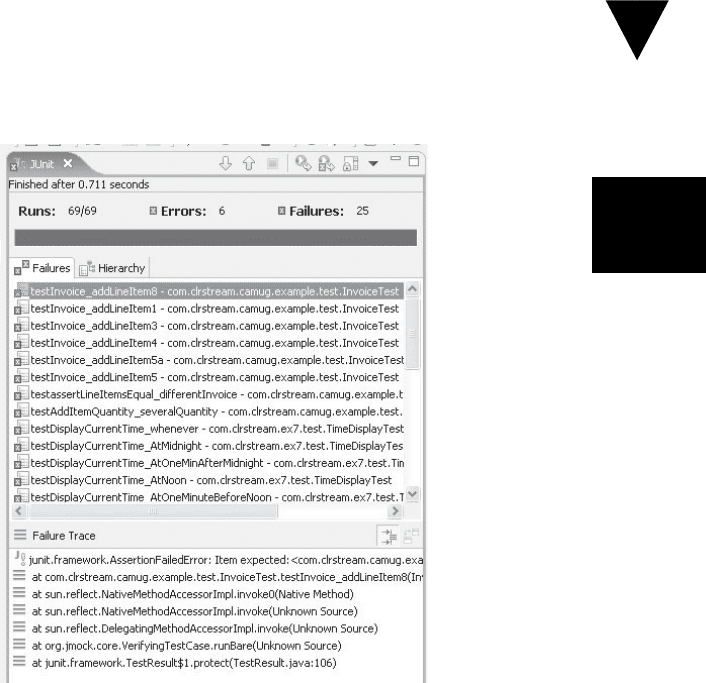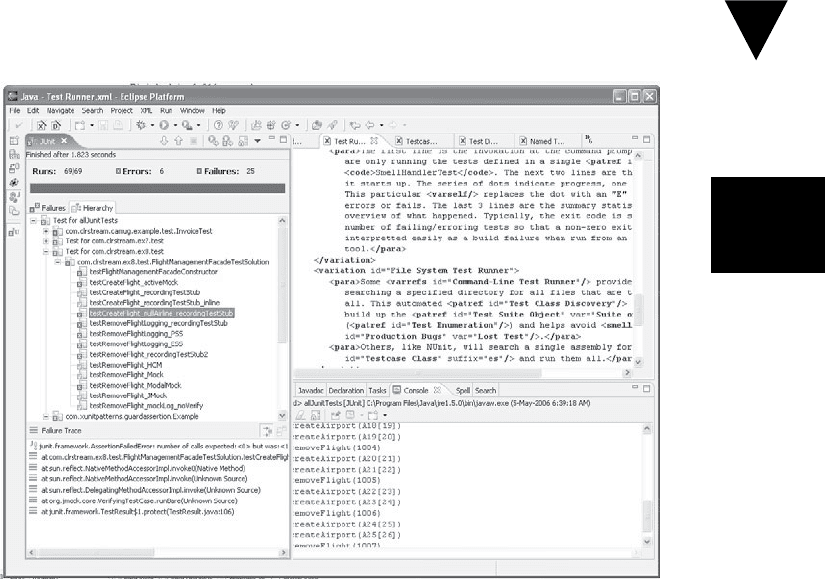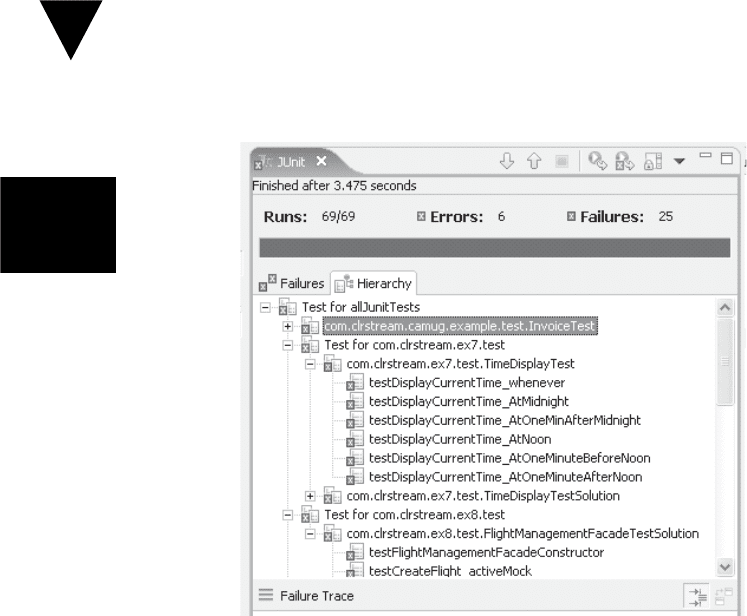Meszaros G. xUnit Test Patterns Refactoring Test Code
Подождите немного. Документ загружается.


Why We Do This
We wouldn’t want each test automater to have to provide a special means of
running his or her own test suites. That requirement would just get in the way
of our ability to simultaneously run all the tests automated by different people.
By providing a standard Test Runner, we encourage developers to make it easy
to run tests written by different people. We can also provide different ways of
running the same tests.
Implementation Notes
Several styles of Test Runners are available. The most common variations are
running tests from within an IDE and running tests from the command line.
All of these schemes depend on the fact that all Testcase Objects implement a
standard interface.
Standard Test Interface
Statically typed languages (such as Java and C#) typically include an interface
type (fully abstract class) that defi nes the interface that all Testcase Objects and
Test Suite Objects must implement. Some languages (such as C# and Java 5.0)
“mix” in the implementation by using class attributes or annotations on the
Testcase Class. In dynamically typed languages, this interface may not exist
explicitly. Instead, each implementation class simply implements the standard
interface methods. Typically, the standard test interface includes methods on it
to count the available tests and to run the tests. Where the framework supports
Test Enumeration, each Testcase Class and test suite class must also implement
the Test Suite Factory method (see Test Enumeration on page 399), which is
typically called suite.
Variation: Graphical Test Runner
A Graphical Test Runner is typically a desktop application or part of an IDE
(either built-in or a plug-in) for running tests. At least one, IeUnit, runs inside a
Web browser rather than an IDE. The most common feature of the Graphical
Test Runner is some sort of real-time progress indicator. This monitor typically
includes a running count of test failures and errors and often includes a colored
progress bar that starts off green and turns red as soon as an error or failure is
encountered. Some members of the xUnit family include a graphical Test Tree
Explorer as a means to drill down and run a single test from within a Suite of
Suites.
Test Runner
378
Chapter 19 xUnit Basics Patterns

Here is the Graphical Test Runner from the JUnit plug-in for Eclipse:
The red bar near the top indicates that at least one test has failed. The upper
text pane shows a list of test failures and test errors. The lower pane shows the
traceback from the failed test selected in the upper pane.
Variation: Command-Line Test Runner
Command-Line Test Runners are designed to be used from an operating system
command line or from batch fi les or shell scripts. They are very handy when
working remotely via remote shells or when running the tests from a build script
such as “make,” Ant, or a continuous integration tool such as “Cruise Control.”
The following example shows how to run an runit (one of the xUnit imple-
mentations for the Ruby programming language) test from the command line:
Test Runner
379
Test Runner

380
Chapter 19 xUnit Basics Patterns
>ruby testrunner.rb c:/examples/tests/SmellHandlerTest.rb
Loaded suite SmellHandlerTest
Started
.....
Finished in 0.016 seconds.
5 tests, 6 assertions, 0 failures, 0 errors
>Exit code: 0
The fi rst line is the invocation at the command prompt. In this example we are
running the tests defi ned in a single Testcase Class, SmellHandlerTest. The next
two lines are the initial feedback as the tests begin. The series of dots indicates
the tests’ progress, one per test completed. This particular Command-Line Test
Runner replaces the dot with an “E” or an “F” if the test produces an error or
fails. The last three lines are summary statistics that provide an overview of
what happened. Typically, the exit code is set to the total number of failed/error
tests so that a non-zero exit code can be interpreted easily as a build failure when
run from an automated build tool.
Variation: File System Test Runner
Some Command-Line Test Runners provide the option of searching a specifi ed
directory for all fi les that are tests and running them all at once. This automated
Testcase Class Discovery (see Test Discovery) avoids the need to build the Suite
of Suites in code (Test Enumeration) and helps avoid Lost Tests (see Production
Bugs on page 268).
In addition, some external tools will search the fi le system for fi les matching
specifi c patterns and then invoke an arbitrary command against the matched
fi les. These fi les can be passed to the Test Runner from a build tool.
Variation: Test Tree Explorer
Members of the xUnit family that turn each Test Method into a Testcase Object
can manipulate the tests easily. Many of them provide a graphical representation
of the Suite of Suites and allow the user to select an entire Test Suite Object or
a single Testcase Object to run. This eliminates the need to create a Single Test
Suite (see Named Test Suite on page 592) class to run a single test.
Here is the Test Tree Explorer of JUnit plug-in for Eclipse shown “popped
out” over other Eclipse views:
Test Runner

381
The left pane of the IDE is the JUnit view within Eclipse. The progress bar ap-
pears at the top of the view, the upper pane is the Test Tree Explorer, and the
lower pane is the traceback for the currently selected test failure. Note that some
Test Suite Objects in the Test Tree Explorer are “open,” revealing their contents;
others are closed down. The colored annotation next to each Testcase Object
shows its status; the annotations for each Test Suite Object indicate whether any
contained Testcase Objects failed or produced an error. The Test Suite Object
called “Test for com.clrstream.ex8.test” is a Suite of Suites for the package “com.
clrstream.ex8.test
”; “Test for allJUnitTests” is the topmost Suite of Suites for run-
ning all the tests.
Test Runner
Test Runner

Testcase Object
How do we run the tests?
We create a Command object for each test and call the run method when we
wish to execute it.
The Test Runner (page 377) needs a way to fi nd and invoke the appropriate Test
Methods (page 348) and to present the results to the user. Many Graphical Test
Runners (see Test Runner) let the user drill down into the tree of tests and pick
individual tests to run. This capability requires that the Test Runner be able to
inspect and manipulate the tests at runtime.
How It Works
We instantiate a Command [GOF] object to represent each Test Method that
should execute. We use the Testcase Class (page 373) as a Test Suite Factory
to create a Test Suite Object (page 387) to hold all the Testcase Objects for a
particular Testcase Class. We can use either Test Discovery (page 393) or Test
Enumeration to create the Testcase Objects.
Testcase
Object
testMethod_n
Testcase
Object
testMethod_1
Testcase
Class
testMethod_1
testMethod_n
Test
Suite
Object
Exercise
Create
Exercise
Create
Create
Fixture
SUT
Run
Suite
Test Runner
Testcase
Object
testMethod_n
Testcase
Object
testMethod_1
Testcase
Class
testMethod_1
testMethod_n
Test
Suite
Object
Exercise
Create
Exercise
Create
Create
Fixture
SUT
Run
Suite
Test Runner
Testcase
Object
Chapter 19 xUnit Basics Patterns
382

Why We Do This
Treating tests as fi rst-class objects opens up many new possibilities that are not
available to us if we treat the tests as simple procedures. It is a lot easier for the
Test Runner of the Test Automation Framework (page 298) to manipulate tests
when they are objects. We can hold them in collections (Test Suite Objects),
iterate over them, invoke them, and so on.
Most members of the xUnit family create a separate Testcase Object for
each test to isolate the tests from one another as prescribed by Independent
Test (see page 42). Unfortunately, there is always an exception (see the sidebar
“There’s Always an Exception” on page 384), and users of the affected Test
Automation Frameworks need to be a bit more cautious.
Implementation Notes
Each Testcase Object implements a standard test interface so that the Test
Runner does not need to know the specifi c interface for each test. This scheme
allows each Testcase Object to act as a Command object [GOF]. This allows
us to build collections of these Testcase Objects, which we can then iterate
across to do counting, running, displaying, and other operations.
In most programming languages, we need to create a class to defi ne the
behavior of the Testcase Objects. We could create a separate Testcase Class
for each Testcase Object. It is more convenient to host many Test Methods
on a single Testcase Class, however, as this strategy results in fewer classes to
manage and facilitates reuse of Test Utility Methods (page 599). This approach
requires that each Testcase Object of the Testcase Class have a way to deter-
mine which Test Method it should invoke. Pluggable Behavior [SBPP] is the
most common way to do this. The constructor of the Testcase Class takes the
name of the method to be invoked as a parameter and stores this name in an
instance variable. When the Test Runner invokes the run method on the Test-
case Object, it uses refl ection to fi nd and invoke the method whose name is in
the instance variable.
Testcase
Object
Testcase Object
383

384
Chapter 19 xUnit Basics Patterns
There’s Always an Exception
Whether we are learning to conjugate verbs in a new language or looking
for patterns in how software is built, there’s always an exception!
One of the most notable exceptions in the xUnit family relates to
the use of a Testcase Object (page 382) to represent each Test Meth-
od (page 348) at runtime. This key design feature of xUnit offers a
way to achieve an Independent Test (see page 42). The only members
of the xUnit family that don’t follow this scheme are TestNG and
NUnit (version 2.x). For the reasons described below, the builders
of NUnit 2.0 chose to stray from the well-worn path of one Testcase
Object per Test Method and create only a single instance of the Test-
case Class (page 373). This instance, which they call the test fi xture, is
then reused for each Test Method. One of the authors of NUnit 2.0,
James Newkirk, writes:
I think one of the biggest screw-ups that was made when we wrote
NUnit V2.0 was to not create a new instance of the test fi xture class
for each contained test method. I say “we” but I think this one was
my fault. I did not quite understand the reasoning in JUnit for cre-
ating a new instance of the test fi xture for each test method. I look
back now and see that reusing the instance for each test method
allows someone to store a member variable from one test and use
it in another. This can introduce execution-order dependencies,
which for this type of testing is an anti-pattern. It is much better to
fully isolate each test method from the others. This requires that a
new object be created for each test method.
Unfortunately, this has some very interesting—and undesirable—
consequences when one is familiar with the “JUnit New Instance Behav-
ior” of a separate Testcase Object per method. Because the object is reused,
any objects it refers to via an instance variable are available to all subse-
quent tests. This results in an implicit Shared Fixture (page 317) along
with all the forms of Erratic Tests (page 228) that go with it. James goes
on to say:
Since it would be diffi cult to change the way that NUnit works now,
and too many people would complain, I now make all of the mem-
ber variables in test fi xture classes static. It’s almost like truth in
advertising. The result is that there is only one instance of this
variable, no matter how many test fi xture objects are created. If
the variable is static, then someone who may not be familiar with
Testcase
Object

how NUnit executes would not assume that a new one is created
before each test is executed. This is the closest I can get to how
JUnit works without changing the way that NUnit executes test
methods.
Martin Fowler felt this exception was important enough that he wrote
an article about why JUnit’s approach is correct. See http://martinfowler.
com/bliki/JunitNewInstance.html.
Example: Testcase Object
The main evidence of the existence of Testcase Objects appears in the Test Tree
Explorer (see Test Runner) when we “drill down” into the Test Suite Object to
expose the Testcase Objects it contains. Let’s look at an example from the JUnit
Graphical Test Runner that is built into Eclipse. Here’s the list of objects created
from the sample code from the write-up of Testcase Class:
TestSuite("...flightstate.featuretests.AllTests")
TestSuite("...flightstate.featuretests.TestApproveFlight")
TestApproveFlight("testScheduledState_shouldThrowIn..ReEx")
TestApproveFlight("testUnsheduled_shouldEndUpInAwai..oval")
TestApproveFlight("testAwaitingApproval_shouldThrow..stEx")
TestApproveFlight("testWithNullArgument_shouldThrow..ntEx")
TestApproveFlight("testWithInvalidApprover_shouldTh..ntEx")
TestSuite("...flightstate.featuretests.TestDescheduleFlight")
TestDescheduleFlight("testScheduled_shouldEndUpInSc..tate")
TestDescheduleFlight("testUnscheduled_shouldThrowIn..stEx")
TestDescheduleFlight("testAwaitingApproval_shouldTh..stEx")
TestSuite("...flightstate.featuretests.TestRequestApproval")
TestRequestApproval("testScheduledState_shouldThrow..stEx")
TestRequestApproval("testUnsheduledState_shouldEndU..oval")
TestRequestApproval("testAwaitingApprovalState_shou..stEx")
TestSuite("...flightstate.featuretests.TestScheduleFlight")
TestScheduleFlight("testUnscheduled_shouldEndUpInSc..uled")
TestScheduleFlight("testScheduledState_shouldThrowI..stEx")
TestScheduleFlight("testAwaitingApproval_shouldThro..stEx")
The name outside the parentheses is the name of the class; the string inside the
parentheses is the name of the object created from that class. By convention, the
name of the Test Method
4
to be run is used as the name of the Testcase Object,
and the name of a Test Suite Object is whatever string was passed to the Test
Suite Object constructor. In this example we’ve used the full package and class-
name of the Testcase Class.
4
I replaced part of the name with “..” to keep each line within the page width limit.
Testcase
Object
Testcase Object
385

This is what this scheme might look like when viewed in a Test Tree Explorer:
Testcase
Object
386
Chapter 19 xUnit Basics Patterns

Test Suite Object
How do we run the tests when we have many tests to run?
We defi ne a collection class that implements the standard test interface and
use it to run a set of related Testcase Objects.
Given that we have created Test Methods (page 348) containing our test logic
and placed them on a Testcase Class (page 373) so we can construct a Testcase
Object (page 382) for each test, it would be nice to be able to run these tests as
a single user operation.
How It Works
We defi ne a Composite [GOF] Testcase Object called a Test Suite Object to hold
the collection of individual Testcase Objects to execute. When we want to run
all tests in the test suite at once, the Test Runner (page 377) asks the Test Suite
Object to run all its tests.
Why We Do This
Treating test suites as fi rst-class objects makes it easier for the Test Runner of
the Test Automation Framework (page 298) to manipulate tests in the test suite.
With or without a Test Suite Object, the Test Runner would have to hold some
kind of collection of Testcase Objects (so that we could iterate over them, count
them, and so on). When we make the collection “smart,” it becomes a simple
matter to add other uses such as the Suite of Suites.
Testcase
Class
Run
Run
Testcase
Object
testMethod_n
Testcase
Object
testMethod_1
testMethod_1
testMethod_n
Test
Suite
Object
Exercise
Create
Exercise
Create
Create
Fixture
SUT
Suite
Test Runner
Run
Testcase
Class
Run
Run
Testcase
Object
testMethod_n
Testcase
Object
testMethod_1
testMethod_1
testMethod_n
Test
Suite
Object
Exercise
Create
Exercise
Create
Create
Fixture
SUT
Suite
Test Runner
Run
Test Suite
Object
Test Suite Object
387
